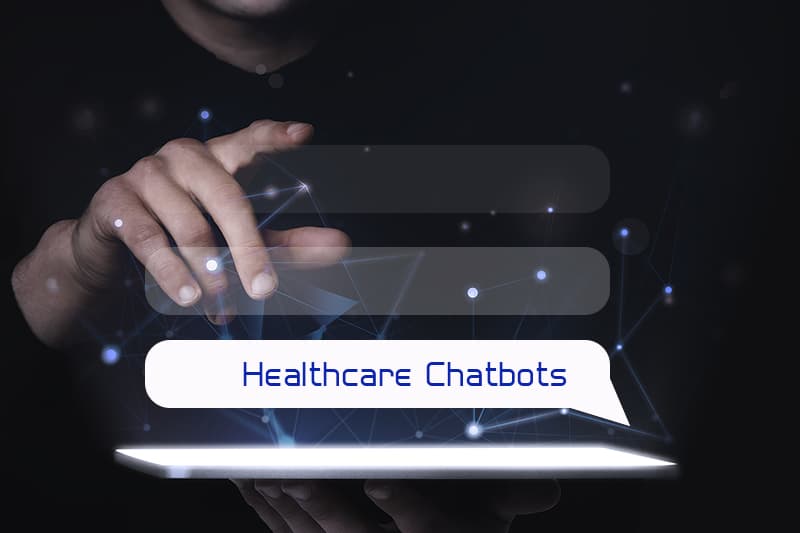In 2022, the healthcare industry has been gaining huge significance by becoming one of the most imperative and vital media for survival. With the pandemic surge, millions of people tend to search for advanced tools for easy and quick access to health information facilities. Chatbots have become a game changer for healthcare organizations like never before. By offering quick and easy access to information, healthcare chatbots are creating a more personalized and engaging channel of interactions. Using Conversational AI for the healthcare industry makes it easy for patients to access healthcare during emergencies, no matter where they are located. Reputable and experienced companies offering business process outsourcing solutions can help apply such advanced technologies effectively in the healthcare sector.
Chatbots Gaining Huge Traction in the Healthcare Industry
In simple terms, healthcare chatbots are conversationalists that run on the rules of machine learning, which comes under artificial intelligence. Apart from carrying out interactions, they perform repetitive tasks like offering solutions, result analysis, email generation and more.
According to a market intelligence report published by BIS Research titled Global Chatbots in Healthcare Market- Analysis and Forecast, 2019-2029, the chatbots in the healthcare market generated a revenue of $36.5 million in 2018. When it comes to the healthcare arena, chatbots automate all the repetitive and lower-level tasks that a representative would do. By allowing handling of simple, monotonous tasks, healthcare professionals can focus their attention on more complex tasks and manage them more effectively. With these virtual conversationalists, patients don’t need to wait in line for hours before a representative with their queries as a healthcare chatbot can provide 24*7 assistance to the patients by instantly answering those queries and providing quick medical support to them at a time of emergency.
In fact, reports from Salesforce Survey suggest that 86 percent of patients believe to get an answer from a chatbot instead of filling in a website form. Apart from this, these intelligent programs are able to detect symptoms, manage medications, and assist with chronic health issues. With technological advancements in chatbots over the decade, there has been significant growth in the healthcare sector. World renowned healthcare companies like Pfizer, the UK NHS, Mayo Clinic, and others are all using Healthcare Chatbots to easily meet the demands of their patients.
Types of Chatbots in the Healthcare Industry
- Conversational or AI Chatbots– These types of chatbots employ natural language processing (NLP) & ML algorithms to learn human intent and language. This is how automated responses answer patient queries most comprehensively. AI-based chatbots are primarily used to schedule an appointment, manage insurance inquiries or provide medical information.
- Rule-based bots (Q&A-focused)– These chatbots follow pre-defined paths as a flowchart where users select an option and the bot instantly responds with an appropriate answer. Typically, these are used by healthcare providers to manage multiple appointments, patient engagement, registration, initial screening, and maintaining health records. Additionally, patients and payers can utilize this type of bot to get replies to queries, analyze claim status, and get notification on specific treatments.
- Informative Chatbots– These are automated client support bots that offer resourceful information to users via push notifications and pop-ups. In most cases, these bots are used by health news sites and mental wellness websites that provide detailed information about specific medical topics.
Key Benefits of Healthcare Chatbots
Chatbots offer several unique benefits in the healthcare industry, not only for practitioners but also for patients. Here listed are some of the top benefits-
- Round-the-Clock Availability– Medical emergencies could arise at any time. Right from identifying symptoms to scheduling surgeries, a patient may need anything at any time. All medical professionals may not be able to attend to everything at all times. Here’s where chatbots come into play. Live agents ensure that access to a medical practice is not restricted to office hours. Existing and potential patients can receive all the information they need at any time of the day or night.
- Provides Critical Information Instantly – Deploying chatbots in healthcare acts as an all-in-one solution to answering all general questions of patients in just seconds. For instance, if a patient rushes in with an attack, the physician can get the patient’s information like previous records, other diseases, allergies, check-ups, etc., instantly over a bot. In addition, these bots can handle other simple questions related to the working hours, documents required for the treatment, insurance coverage and other payment tariffs in a proficient manner.
- Scalability – To address multiple requests simultaneously, it is important to have more people on board. But, intelligent bots can efficiently handle anywhere between 1 to 1000 interactions at one time, without any glitches.
- Easy Appointment Scheduling– Scheduling appointments is one of the challenging tasks in any healthcare facility. Despite scheduling systems, several patients face challenges in navigating the scheduling system. Due to the long wait times and slow service, nearly 30 percent of patients leave an appointment, while 20 percent permanently change providers. According to Forbes, a single missed appointment can cost a medical practice $200 on average. An healthcare Chabot asks patients about their health concerns, looks for a matching physician, provides available time slots, schedules, reschedules, and deletes appointments. In addition, these digital assistants can notify and send reminders to patients regarding updates about medical appointments. This greatly reduces the possibility of the patient not turning up at the scheduled time.
- Access Patient Data – Chatbots can help healthcare providers to access key patient information. First, a chatbot uses simple and basic questions like the patient’s name, contact number, address, symptoms, current doctor, and information regarding insurance. Then it stores the extracted data into the medical facility system to make things easier like patient admission, doctor-patient communication, tracking of symptoms, and medical record keeping.
- Collect Patients’ Feedback– Acquiring feedback from the patients is an important aspect that helps enhance healthcare services. Deploying a chatbot for healthcare helps analyze what the patients think regarding the hospital, treatment, doctors, and their overall experience via simple automated conversation.
- Efficient Record-keeping – Virtual assistants also help with record keeping. The use of AI chatbots in healthcare helps drive informed decision-making with instant notifications to health specialists on vital data.
- Big Savings – Deploying a medical chatbot helps to handle tasks efficiently without the need for extra resources. Healthcare bots are predicted to save $3.6 billion worldwide by 2022.
As natural language understanding and artificial intelligence technologies evolve, we will see the emergence of more advanced healthcare chatbot solutions. They are adding a new dimension to different aspects of a healthcare business. However, the successful adoption of healthcare chatbots will require a fine balance between human understanding and machine intelligence to develop chatbot solutions that can address healthcare challenges. Reputable providers of back office outsourcing solutions make use of these technologies to carry out various healthcare processes more efficiently.
The top use cases of chatbots and the crucial factors to consider when implementing a healthcare chatbot will be discussed in the next blog.




